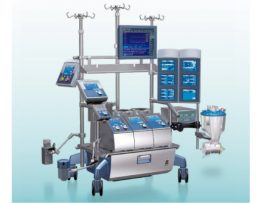Abstract Introduction/Aim: The patient’s condition and high-risk nature of extracorporeal membrane oxygenation (ECMO) therapy force clinical services to ensure clinicians are properly trained and always ready to deal effectively with..
Read MoreAbstract Background: Development of a high-fidelity cardiac surgery simulator (CSS) requires integration of a heart model with a mock cardiopulmonary bypass (CPB) circuit that can provide feedback to mimic the..
Read MoreAbstract Conventional extracorporeal membrane oxygenation (ECMO) training usually only consists of didactic lectures and water drill of ECMO circuit. However, learners cannot “experience” changes of clinical condition of patients. Simulation-based..
Read MoreAbstract Extracorporeal life support and extracorporeal membrane oxygenation (ECMO) are widely used for acute severe refractory cardiac and respiratory failure. An increasing number of patients are treated with ECMO worldwide. This can be attributed to..
Read MoreAbstract Technology in healthcare has become increasingly prevalent and user friendly. In the last decade, advances in hands-free methods of data input have become more viable in a variety of..
Read MoreAbstract Perfusion education programs use simulation to provide students with clinical skills prior to entering the operating room. To teach the psychomotor execution of skills in a simulation lab requires..
Read MoreAbstract The utilization of simulators for training is increasing in the professions associated with cardiac surgery. Before applying these simulators to high-stakes assessment, the simulator's output data must be validated...
Read MoreAbstract Background There is limited literature exploring the relationship between simulation training and cardiopulmonary resuscitation (ECPR) outcomes. We examined whether there was an association between the implementation of an training program and..
Read MoreAbstract Objectives There is little knowledge about which elements of health care simulation are most effective in improving patient safety. When empirical evidence is lacking, a consensus statement can help..
Read MoreAbstract Introduction: Pediatric extracorporeal membrane oxygenation (ECMO) is a high risk, low-volume technology. Infrequency of this technology and associated complications may translate to unfamiliarity of identification and management of potentially..
Read MoreAbstract Over the past 10 years, there has been an increase in the use of high-fidelity simulation (HFS) as a tool to support and enhance learning in health profession programs. In..
Read MoreAbstract Over the past 10 years, there has been an increase in the use of high-fidelity simulation (HFS) as a tool to support and enhance learning in health profession programs. In..
Read MoreYour Ultimate Guide to Get to Know virCPB Welcome to the world of virCPB, where education meets gaming to revolutionize the way perfusion students and perfusionists train and master their..
Read MoreCurious about why we chose to develop a video game instead of a mere online simulator? We receive this question frequently, so let us share with you a few compelling..
Read MoreAbstract Simulation based learning is becoming a crucial part in ECMO education. Simulation can provide a safe but also very realistic learning experience depending on simulation fidelity. In our institution..
Read MoreAbstract Introduction Adult and pediatric ECMO procedures have been increasingly established as conventional life-saving modalities in critical care services across the world. Since 2017, a multidisciplinary team of program advisors..
Read MoreAbstract Background: Since 2013, the cardiac intensive care unit (CICU) at Children's National has conducted annual extracorporeal membrane oxygenation cardiopulmonary resuscitation (ECPR) simulations that focus on team dynamics, room setup, and..
Read MoreAbstract Background Extracorporeal Membrane Oxygenation (ECMO) is a high-risk, low-volume procedure requiring repetition, skill and multiple disciplines with fidelity of communication. Yet many barriers exist to maintain proficiency and skills..
Read MoreAbstract Objective We conducted a prospective study to assess the face and content validity of a new virtual reality (VR) extracorporeal circulation simulator (ECC) developed for perfusionists to facilitate training..
Read MoreAbstract Background This study aims to improve nursing students’ ability to care for critically ill patients through education in extracorporeal membrane oxygenation (ECMO) nursing. Methods This study developed a virtual..
Read MoreAbstract Background Nontechnical skills in cardiac surgery are vital in ensuring patient safety in the operating room (OR). To train these skills in a simulation-based scenario, a collection of commonly..
Read MoreAbstract Background Traditionally, novice perfusionists learn and practice clinical skills, during live surgical procedures. The profession’s accrediting body is directing schools to implement simulated cardiopulmonary bypass (CPB) into the curriculum...
Read MoreAbstract Background Simulation has become a staple in the training of healthcare professionals with accumulating evidence on its effectiveness. However, guidelines for optimal methods of simulation training do not currently..
Read MoreAbstract Background Over the past decade, the implementation of simulation education in health care has increased exponentially. Simulation-based education allows learners to practice patient care in a controlled, psychologically safe..
Read MoreAbstract Simulation plays a pivotal role in addressing universal healthcare challenges, reducing education inequities, and improving mortality, morbidity and patient experiences. It enhances healthcare processes and systems, contributing significantly to..
Read MoreAbstract Introduction Extracorporeal techniques have been present in medicine for over 70 years. Many factors in history have influenced their development and popularisation, in particular the first discoveries of heparin..
Read MoreAbstract Introduction Simulation-based learning has become an essential element in entry-level perfusion education. While the use of simulation has been demonstrated to improve patient outcomes, few institutions possess the budgetary..
Read MoreAbstract Distance simulation is a method of health care training in which the learners and facilitators are in different physical locations. Although methods of distance simulation have existed in health..
Read MoreAbstract In this article, we present a generic model for social and cognitive skills that can be used in work and (simulation-based) education in healthcare. We combined existing non-technical skills..
Read MoreAbstract Simulation educators are often requested to provide multidisciplinary and/or interprofessional simulation training in response to critical incidents. Current perspectives on patient safety focus on learning from failure, success and..
Read More










